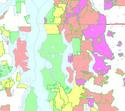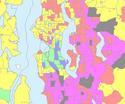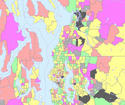During tough economic times, technology is often seen as the one bright spot. In the U.S. this past year technology jobs outpaced the overall rate of new employment nearly four times. But if you’re looking for a tech job, you may want to consider searching outside of Silicon Valley. Though the Valley may still be the big enchilada in terms of venture capital and innovation, it hasn’t consistently generated new tech employment. read more »
Seattle
Major Metropolitan Commuting Trends: 2000-2010
As we indicated in the last article, solo automobile commuting reached an all time record in the United States in 2010, increasing by 7.8 million commuters. At the same time, huge losses were sustained by carpooling, while the largest gain was in working at home, which includes telecommuting. Transit and bicycling also added commuters. This continues many of the basic trends toward more personalized employment access that we have seen since 1960. read more »
Moving from the Coast
For years both government and media have been advancing the notion that America's coastal counties are obtaining most of the population growth at the expense of interior counties. For example, the National Oceanic and Atmospheric Administration reported in the 1990s: Coastal areas are crowded and becoming more so every day. More than 139 million people–about 53% of the national total–reside along the narrow coastal fringes. read more »
The Evolving Urban Area: Seattle
Lunching at Seattle's Space Needle, the casual observer might imagine that one of the nation's most dense urban areas is spread out below. To the immediate south of the Space Needle is one of the nation's premier downtown areas. In 2000 downtown Seattle had the seventh largest employment base in the country and was one of the most dense. Its impressive, closely packed buildings witness a storied past. read more »
Hey, Dad: Family Still Matters!
America is getting older. Those over the age of 65, which currently account for 12% of the population, are expected to make up 20% of the population by 2030. People are marrying later, and a growing group, though still a distinct minority, is choosing not to have children. read more »
- Login to post comments
Will the Last Family Leaving Seattle Please Turn out the Lights?
New Census data for the Seattle area's population changes, 2000-2010, permit a preliminary look at age and at types of households in the region. Let's look at patterns of geographic variation in selected age groups and household types for places in greater Seattle. It provides more evidence for how rapidly Seattle in particular is changing in fundamental ways. read more »
Listing the Best Places Lists: Perception Versus Reality
Often best places lists reflect as much on what’s being measured, and who is being measured as on the inherent advantages of any locale. Some cities that have grown rapidly in jobs, for example, often do not do as well if the indicator has more to do with perceived “quality” of employment. read more »
Is The Information Industry Reviving Economies?
For nearly a generation, the information sector, which comprises everything from media and data processing to internet-related businesses, has been ballyhooed as a key driver for both national and regional economic growth. In the 1990s economist Michael Mandell predicted cutting-edge industries like high-tech would create 2.8 million new jobs over 10 years. This turned out to be something of a pipe dream. read more »
Stories from the 2010 Census: Race and Ethnic Change in Washington State
The city of Seattle is an exceptional place. The 2010 census figures on race, ethnicity and age confirm this reputation. The main story from the census findings is the continued gentrification of Seattle, with displacement of minorities and the less affluent out of the center of the city, especially to south King county and Pierce county. The city core is becoming whiter, while the edges and suburbs, north and east as well as south are becoming far more diverse. read more »
Washington State's Evolving Demography
Population change in the state of Washington has relevance to the nation and to other states because it tells us something about market preferences of households versus the orientation of planners (e.g., “smart growth”). It tells us much about gentrification and America’s changing racial and ethnic diversity. read more »






















